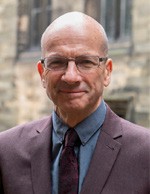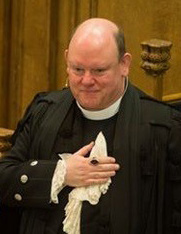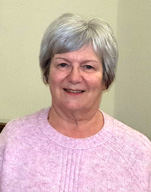The Big Question
This month’s question is: ‘March 21 is World Poetry Day. What poem is special to you and why?’

Clare Flenley, Research Officer, Policy and Public Affairs Team, Faith Impact Forum
“A friend of mine who writes says that a poem should be just one idea, and I like the notion of a thought or feeling crystalised, or frozen into the imagination. This poem definitely feels like it’s frozen – The Darkling Thrush by Thomas Hardy.
“Hardy gives you a shiver as he describes a bleak, cold, darkening winter’s afternoon. ‘Frost was spectre-gray,/ And Winter’s dregs made desolate/ The weakening eye of day’.
“The sense of melancholia, even dread, that pervades is prescient, as the poem was written on the eve of the year 1900, with the nightmares of World War One about to unfold. ‘The ancient pulse of germ and birth / was shrunken hard and dry/ And every spirit upon earth/ Seemed favourless as I.’
“Into this dreary world, comes a sudden, sharp shriek of joy from a tiny bird, ‘frail, gaunt and small” who has “chosen thus to fling his soul/ upon the growing gloom’. And with this the whole mood lifts.
The writer begins to wonder if the thrush is announcing ‘some blessed Hope, whereof he knew/ And I was unaware’.
“If I’m feeling anxious about what’s happening to nature, this poem can cheer me up.
“I like the idea that nature does not feel anxious about the future.
“When we look at environmental problems, nature can seem vulnerable like the tiny thrush, but actually nature is very strong, and its life force can help to heal us.”

Dave Kendall, Chief Officer, Office of Assembly Trustees, Church of Scotland
“As a young man at school in the 1970s I didn’t really have an appreciation of the reality of war.
“The World Wars seemed like something a very long time in the past until I realised that the Second World War actually finished just a few years (13) before I was born.
“My granddad received a medal in the First World War but never spoke about it or why he was awarded it such was the pain of it all – quite hard to understand really as someone who was cushioned from what happened.
“I read a poem at school that would have a lifelong impact on me.
“The poem was Dulce et Decorum est by Wilfred Owen, a famous poet who wrote of the horrors of the First World War. It conjured up images of the conflict, suffering and cruelty of war that I had never thought of or understood.
“War was glamorised to some extent in the films of the time. However, the tale told by this poem really disturbed me.
“The Latin title of the poem means ‘it is sweet and fitting’ followed by pro patria mori, which means ‘to die for one’s country’. The central tension is between the reality of war and the government’s portrayal of it being sweet, right and fitting to die for your country.
“The message that the poet conveys is that war can be horrific and inhuman – truly brought to life by the images the poet clearly witnessed himself.”

The Very Rev Dr Derek Browning, minister, Edinburgh: Morningside
“Poetry is an essential part of my life and my faith. It shapes the way I write prayers in particular.
“The Psalms, are song-poems whose words paint pictures in snapshots of insight and inspiration. I love the way poetry breathes and has rhythm and drive, both gentle and persistent. I also love the concision poetry deploys using fewer words to say greater things, engaging not only our thoughts but our emotions.
“Louis Macneice talks about ‘the splash of words’ which is a good way to think of poetry. Michael Longley says: ‘If prose is a river, poetry is a fountain.”’
“Interesting that both poets capture the dynamic, fluid-stillness poetry embodies.
“I have many favourite poems, but I love ‘Come to the Edge’ by Christopher Logue.
Come to the edge.
We might fall.
Come to the edge.
It’s too high!
COME TO THE EDGE!
And they came, And he pushed, And they flew.
“Who is the ‘he’? A father teaching a child to dive into a pool.
“Or a Saviour teaching the doubting faithful to take that great, troubling, exhilarating step into the unknown, to be upheld by the invisible of the air, to dip and to soar and to fly into an imaginative future that is already held in the hands of an ever-present God?”

Helen Eckford, National Vice Convener, Church of Scotland Guild
“I first read Robert Southey’s poem, The Inchcape Rock, when I was in my first year of secondary school.
“The haunting narrative tells the story of the legend of Inchcape Rock.
“At the age of 12, I was gripped by the story of the Abbot of Aborbrothok (Arbroath) who placed a bell on a buoy near the rock.
“The buoy would move in rough seas and the bell would ring to warn ships of the danger of the sea-covered reef.
“Ralph the Rover, an evil pirate, removed the bell endangering passing ships.
Years later he returned and perished when his ship broke on the reef and sank.
“The poem is a moralistic tale, for a 12-year-old; a tale of good versus evil where evil is punished.
“As an adult, there is still a message, whatsoever a man soweth, that also shall he reap.
“Some years later, I learned the story of the Bell Rock lighthouse, the oldest working sea-washed lighthouse in the world, designed by the engineer Robert Stevenson and built at the beginning of the 19th century on the Bell Rock, a reef 11 miles southeast of Arbroath in the North Sea.
“The lighthouse was built as a result of Stevenson’s determination and faith. The action of a man of faith in the 14th century, was completed by the action of a man of faith 500 years later.
“Faith in action.
“I like that message too!”

Anna Reid, member Edinburgh: St Stephen’s
“I embarked on the poetry train journey of Auden’s ‘Night Mail’ when I was at school, and have taken the journey many times since.
“Night
Mail is an extremely powerful poem, which has to be read aloud to get the train on the tracks momentum going.
“I used to love to read this poem in the class at school and the teachers used to say that I brought the words alive.
“Especially in the sixth stanza: ‘Letters of thanks, letters from banks, Letters of joy from the girl and the boy, Receipted bills and invitations to inspect new stock or visit relations,’
“I can hear the clickety clack of the train wheels on the track as I read this poem.
“The poem tells many stories of human life ‘letters for the rich, letters for the poor, the shop at the corner and the girl next door’, mail is delivered to anyone no matter who you are in life.
“Trains don’t sound clickety clack on the rail tracks the way they did in Auden’s time, and the genteel tea rooms of Cranston’s and Crawford’s are sadly gone too.
“However, Auden’s poem remains an evocation of times past.
“Take the journey yourself if you haven’t already.”
Visit us online www.lifeandwork.org